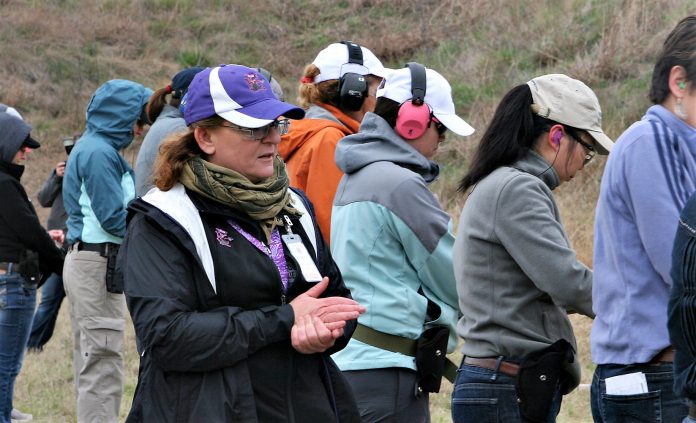
When making a major purchase, a smart consumer will research options, read reviews, and compare products. A good student will do the same when seeking a firearms instructor and evaluating the quality of training offered. You are making an investment with your consumer dollars — and your life may someday depend on this training.
The first step is to learn where your instructor received training and make sure that you’re getting quality and correct information. Modern gunfighting skills have not changed too much in the past decades as far as standards of safe gun handling and points of marksmanship. There are leaders in the firearms industry who set the standards of exceptional training, such as Kathy Jackson pictured, above. Some people are fortunate to have trained with these individuals and share their knowledge throughout the country. Be wary of instructors that modify these techniques and believe that they are being innovative with their own style or interpretation. Avoid instructors who rely on YouTube for training.
As you learn from a new instructor, he or she must model safe gun handling at all times and the training facility must be safe. It is okay to ask questions about any skills or drills that you are told to do that may be unsafe. Learn *why* an instructor tells you to do maneuvers or movements, especially when it may slow your response or impede your accuracy. For example, if an instructor asks you to bring your gun to a low ready instead of a compressed ready when checking your six, would you know if that compromises your safety? It is your responsibility to know your instructor’s background and question techniques that may seem “outside the box” of industry standards.
Red Flags
Proceed cautiously if your instructor has these characteristics:
1. No diversity in training. Most good instructors have trained with a variety of mentors that discuss different styles and methodologies. For example, there are several approved grips and stances. Some instructors force students to adopt one methodology, but the best instructors will analyze what is best suited for the student’s body and performance.
2. Lacks professional credentials. Even if your husband has been shooting his entire life, he’s not automatically a firearms instructor. He may be able to give you some pointers, but your private lessons should be with someone who is a professional with countless hours behind the trigger. Keep in mind that military and law enforcement may have received exceptional firearms training, but that does not mean that he or she is a firearms instructor. Further, instructors that do not have experience teaching civilians may have mindset and tactics that are very different from the training you want.
3. New instructor. If he or she has only recently become an instructor, or maybe even a gun owner, he or she may not be a good resource. Look to the intensity and diversity of training before deciding to take a class or lesson.
4. Non-teaching certifications. A person may be certified to teach a License to Carry or CCW permit course, but he or she may not be a firearms instructor that can teach safe gun handling and points of marksmanship. One teaches you how to shoot; one teaches the law for a permit or license.
5. Sketchy marketing. Your instructor’s website or Facebook page should have a list of training credentials and online reviews. Having 100% of positive reviews should raise your eyebrows, since it is normal for some students to not connect with an instructor 100% of the time. Even the best instructors receive criticisms, so make sure you have exposure to those, too, so you can make your own decisions. Also keep your ego in check to recognize if an instructor is using you for marketing if you have a large social media following or community of potential new students.
6. Bashes other instructors. Instructors that do not encourage you to seek additional training either have large egos that are overconfident about their curriculum or worry that you will give your consumer dollars to someone else, which you have every right to do. Of course your instructor may dislike other instructors’ personalities or methods, but he or she should be able to point you to a list of colleagues or classes besides his or her own.
7. Does not take training classes. A reputable instructor is not always the teacher, but enjoys being a student. He or she will attend continuing education sessions and training to constantly advance and/or reinforce their skills.
8. Shows off. An instructor may demonstrate a drill for the class or student, but it is not a time to show off. If your instructor is being a “hot shot” or shoots more than you do, find a new instructor.
9. Not connected. The firearms industry is very competitive, but also very interconnected. Good instructors collaborate and participate in the greater firearms community. See if your instructor has ever taught at the A Girl & A Gun National Training Conference, the Polite Society Tactical Training Conference, or other reputable gatherings.
Names to Look For
As you look at your instructor’s bio and resume, you want see these names: Kathy Jackson (Cornered Cat), Karl Rehn (KR Training), Massad Ayoob and Gail Pippen, Tom and Lynn Givens (Rangemaster), Marty and Gila Hayes, Robert Vogel, Ben Stoeger, Rob Leatham, Ken Hackathorn, Larry Vickers, Paul Howe, Clint Smith (Thunder Ranch), Jerry and Kay Miculek, John and Vicki Farnam, Jim Higginbotham, and those who have trained with them. There are many other incredible and reputable instructors as well. The point is: do your research.
It may take you some time to research who trained with whom, but it is important. Don’t be guilty of reading more reviews about a product on Amazon than about your firearms instructor and information that may potentially save your life. When in doubt, ask an organization that you trust for feedback and guidance.
SOURCE ARTICLE: https://www.agirlandagun.org/how-do-you-know-if-youre-getting-good-training/



